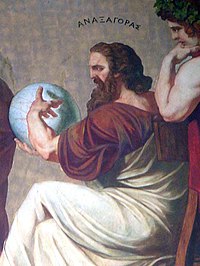Anaxagoras
| Anaxagoras | |
|---|---|

Anaxagoras; part of a fresco in the portico of the National University of Athens.
|
|
| Born | c. 510 BC Clazomenae |
| Died | c. 428 BC Lampsacus |
| Era | Ancient philosophy |
| Region | Western Philosophy |
| School | Pluralist school |
|
Main interests
|
Natural philosophy |
|
Notable ideas
|
Cosmic mind (Nous) ordering all things The Milky Way (Via Lactea) as a concentration of distant stars |
|
Influences
|
|
Anaxagoras (/ˌænækˈsæɡərəs/; Greek: Ἀναξαγόρας, Anaxagoras, "lord of the assembly"; c. 510 – c. 428 BC) was a Pre-Socratic Greek philosopher. Born in Clazomenae in Asia Minor, Anaxagoras was the first to bring philosophy to Athens. According to Diogenes Laertius and Plutarch, in later life he was charged with impiety and went into exile in Lampsacus; the charges may have been political, owing to his association with Pericles, if they were not fabricated by later ancient biographers.
Responding to the claims of Parmenides on the impossibility of change, Anaxagoras described the world as a mixture of primary imperishable ingredients, where material variation was never caused by an absolute presence of a particular ingredient, but rather by its relative preponderance over the other ingredients; in his words, "each one is... most manifestly those things of which there are the most in it". He introduced the concept of Nous (Mind) as an ordering force, which moved and separated out the original mixture, which was homogeneous, or nearly so.
He also gave a number of novel scientific accounts of natural phenomena. He produced a correct explanation for eclipses and described the sun as a fiery mass larger than the Peloponnese, as well as attempting to explain rainbows and meteors.
...
Wikipedia
